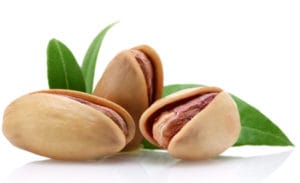[This article was previously published in the spring issue of The Cultivator, Cornucopia’s quarterly newsletter.]
by Rachel Zegerius,
Communications and Development Associate at The Cornucopia Institute
 “Resilience,” says unlikely farmer Bill Barrackman of his 26-year journey growing pistachios, “is one of the most important parts of farming.” He continues, “Sometimes you think you’ve done everything right, and the market doesn’t respond.” It’s those times, he says, that call on a farmer’s ability to adapt and keep the faith.
“Resilience,” says unlikely farmer Bill Barrackman of his 26-year journey growing pistachios, “is one of the most important parts of farming.” He continues, “Sometimes you think you’ve done everything right, and the market doesn’t respond.” It’s those times, he says, that call on a farmer’s ability to adapt and keep the faith.
“Every process is a challenge, a learning opportunity,” says Barrackman. And, farming in Amargosa Valley, Nevada certainly presents its own unique set of provocations. Water rights issues, alkaline soils, and the absence of a private organic certification company in the state, as the Nevada Dept. of Agriculture plans to end its program in June of 2016, are just a few.
“It requires systems thinking, really,” observes Barrackman. Understanding how the parts of a whole influence one another means seeing the entire orchard, and associated operations, as one organism. Seemingly skilled at applying this holistic approach, he likens this characteristic of his job as an organic pistachio farmer with his previous career as a systems analyst and programmer.
Bill Barrackman and his wife Rita came to organic farming almost by accident. In search of a piece of land 100 miles outside of Las Vegas as a place to build a garage in which to upgrade an antique automobile, they instead decided to invest in an ailing pistachio orchard.
Since purchasing the 37-acre property in 1990, they have planted 5,000 trees, installed a completely new irrigation system, and obtained organic certification (1996), a process which took 3 years. And, like most crops, growing pistachios organically is no easy task.
He has learned that “You have to think ahead and consider variables beyond your control.” Organic agriculture, he finds, often requires deep learning and high-level thinking.
The process of observation, diagnosis, action, and evaluation is applied on so many levels by farmers today. “It’s kind of like
playing chess,” Barrackman notes. “You have to think 3-4 moves ahead during any decision-making process. Farming is a lot like that.”
For example, he mentions “We had no intention of building our own processing facility.” But, in 2000, when he ran into timing and batch restrictions imposed by his processor, the Nevada grower found himself hands-on designing and engineering equipment for the construction of their own processing plant.
And, it’s not only production concerns that farmers have to watch. They need to stay attuned to weather variability, erratic pollination, insect damage, economic flux, and assorted marketing pressures.
“Marketing is a big part of the success of any operation,” says Barrackman. The initial impulse of an organic farmer to sell their product to a large retailer, even a health food store chain, may not always work.
“The prices these stores are willing to pay keep getting pushed down to the point where you, as a farmer, are barely making enough money to sustain your operation,” he explains. “Then, the retailer inflates the price and makes the majority of the profit.”
Today, the Barrackmans direct market pistachios through their website at organicpistachios.com. But, he notes, most of their pistachios are ultimately sold directly to distributors, typically between 30,000 and 35,000 pounds annually.
Last year, however, Saddleback Orchard’s production fell to only 10,000 pounds. It was not a good crop year for many pistachio farmers throughout California and Nevada. While pistachios thrive in dry climates, early spring weather patterns may have had an impact.
Finding ways to predict and plan for the impacts brought by our changing climate is another challenge suited for systems thinking. How do we view a complex network of interrelated activities, where the whole is not equal to the sum of its parts?
Many anti-reductionists see agriculture sitting at the intersection of natural and social systems – applied ecology meets agrarian society.
When asked if he’d do it all over again, Barrackman repeats the question. “No,” he says with an enlightened laugh, and adds with amusement, “If I would’ve invested a fraction of the money I invested into the orchard into private golf lessons, I’d be on the Senior PGA Tour right now.”

